Dogs can eat some fruits and vegetables, but it’s important to know which ones are safe for them. While dogs don’t necessarily need fruits and vegetables in their diet, these foods can be offered as treats or snacks in moderation. It’s crucial to be aware of which berries are safe for dogs to consume and which ones should be avoided, as some berries can be toxic to dogs. Let’s explore the different types of berries that dogs can eat safely.
Key Takeaways:
- Not all berries are safe for dogs to eat, some can be toxic.
- Safe berries for dogs include blueberries, strawberries, raspberries, and blackberries.
- Avoid feeding dogs grapes and raisins, as they can cause kidney failure.
- Always remove seeds, pits, and any harmful parts before offering berries to dogs.
- Consult with your vet before making any changes to your dog’s diet.
Fruits Dogs Can and Can’t Eat
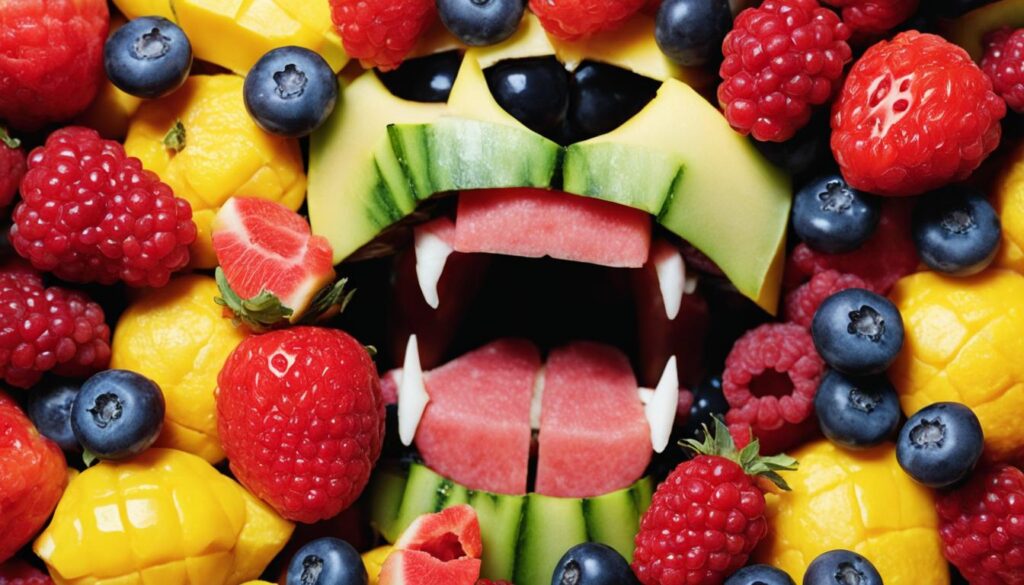
Dogs can enjoy the taste of certain fruits, but it’s essential to be aware of which ones are safe for them. Here’s a breakdown of the fruits that dogs can eat in moderation and the ones they should avoid.
Safe Fruits for Dogs
Dogs can safely indulge in the following fruits:
- Apples
- Bananas
- Blueberries
- Cantaloupe
- Cranberries
- Cucumbers
- Mangoes
- Oranges
- Peaches
- Pears
- Pineapples
- Pumpkins
- Raspberries
- Strawberries
- Watermelon
These fruits not only provide dogs with a delicious treat but also offer various health benefits. Rich in vitamins, minerals, and antioxidants, they can be a nutritious addition to your canine companion’s diet.
Fruits to Avoid
On the other hand, there are fruits that dogs should never consume:
- Avocados
- Grapes
- Raisins
These fruits can be toxic to dogs and may lead to serious health issues. It’s crucial to keep them out of your dog’s reach to ensure their well-being.
Incorporating safe fruits into your dog’s diet can provide them with additional nutrients and a tasty variety. Always consult with your veterinarian to determine the right amount of fruit to include in your dog’s overall diet.
Apples
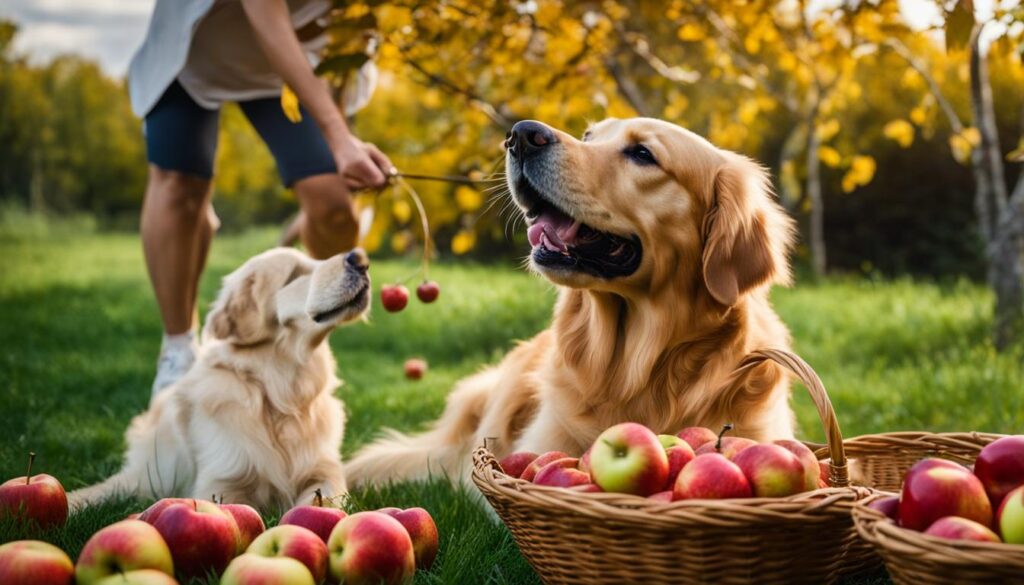
Apples are not only a delicious and popular fruit for humans but are also a safe and healthy option for dogs. Dogs can eat apples, and they can provide several nutritional benefits to our furry friends.
Firstly, apples are a good source of vitamins A and C, which are essential for maintaining a strong immune system in dogs. These vitamins help to protect against various illnesses and promote overall health and well-being.
In addition to vitamins, apples contain fiber, which aids in digestive health for dogs. Including apples in their diet can help regulate bowel movements and prevent constipation.
However, it’s important to note that not all parts of an apple are safe for dogs to consume. The seeds and core of an apple contain a substance called amygdalin, which can release cyanide when ingested. Cyanide is toxic and can cause serious health issues in dogs.
Therefore, when offering apples to your furry companion, always ensure that you remove the seeds and core first. It’s also a good idea to cut the apple into small, bite-sized pieces to make it easier for your dog to eat and digest.
Apples can be served to dogs in various ways. You can offer them fresh apple slices as a healthy snack, or you can freeze the slices for a refreshing treat on a hot day. Some dog owners also like to incorporate apples into homemade dog treats or mix them into their dog’s regular meals for added flavor and nutrition.
Remember, moderation is key when feeding apples to your dog. While they are safe and nutritious, too much of any fruit can upset your dog’s stomach or lead to weight gain. Always consult with your veterinarian before making any significant changes to your dog’s diet or introducing new foods.
| Benefit | Explanation |
|---|---|
| Vitamins A and C | Apples are a good source of vitamins A and C that support the immune system of dogs. |
| Fiber | Apples contain fiber that aids in digestion and prevents constipation. |
| Seeds and Core | The seeds and core of an apple should be removed as they can be toxic to dogs. |
Bananas
Dogs can eat bananas as they are a great low-calorie treat. Bananas are high in potassium, vitamins, biotin, fiber, and copper. However, due to their high sugar content, bananas should be given in moderation as a treat and not as a main part of the dog’s diet.
While bananas can be a healthy addition to a dog’s diet, it’s important to remember that they should be fed in moderation. Too much of any fruit, including bananas, can lead to an upset stomach or digestive issues in dogs. Therefore, it’s recommended to offer small, bite-sized pieces of banana as an occasional treat rather than a daily staple.
Bananas can provide some nutritional benefits to dogs. The potassium content in bananas can support proper heart and muscle function in dogs. Additionally, the fiber found in bananas can help regulate bowel movements and promote a healthy digestive system for dogs.
When giving bananas to dogs, make sure to remove the peel before offering them. The peel is difficult for dogs to digest and can pose a choking hazard. It’s also important to choose ripe bananas that are not overly green or too mushy. Ripe bananas are easier for dogs to digest and offer a sweeter taste.
Overall, bananas can be a safe and healthy treat for dogs when given in moderation. However, it’s always best to consult with your veterinarian before introducing any new foods to your dog’s diet, especially if your dog has any specific dietary restrictions or health conditions.
Benefits of Bananas for Dogs:
- High in potassium, which supports heart and muscle function
- Contain vitamins, such as biotin and vitamin C
- Good source of dietary fiber for a healthy digestive system
- Low in calories, making them a suitable treat for weight management
Precautions when Feeding Bananas to Dogs:
- Feed bananas in moderation to avoid digestive issues
- Remove the peel before offering bananas to dogs
- Choose ripe bananas that are not overly green or mushy
- Consult with a veterinarian before introducing bananas to your dog’s diet
| Bananas for Dogs | Safe or Not? |
|---|---|
| Can dogs eat bananas? | Yes |
| Are bananas safe for dogs? | Yes, in moderation |
| What are the benefits of bananas for dogs? | High in potassium, vitamins, and fiber |
| Can dogs have too many bananas? | Avoid excessive consumption, as it can cause digestive issues |
Blueberries
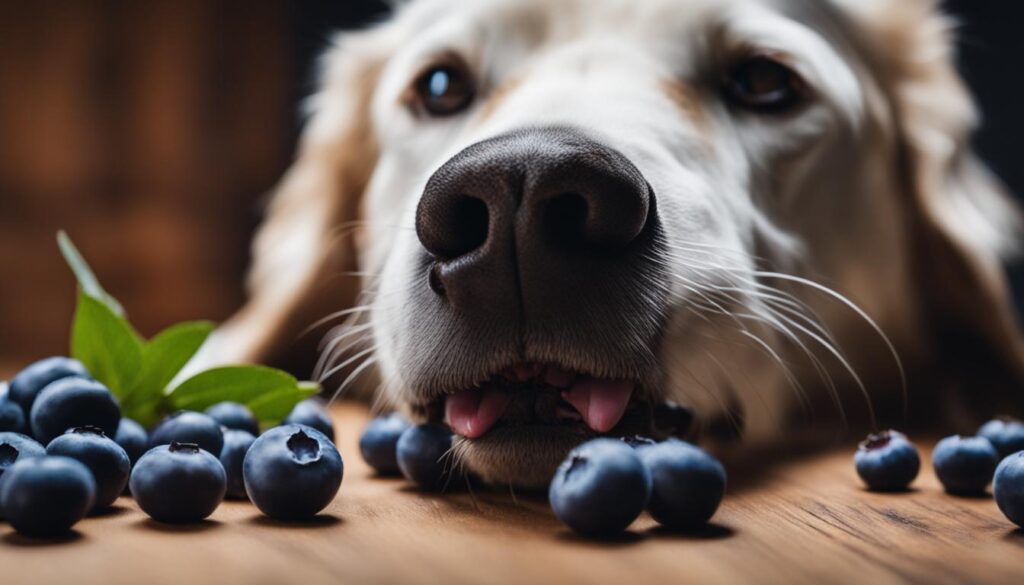
Dogs can eat blueberries as they are a superfood rich in antioxidants. Blueberries are packed with fiber and phytochemicals, making them a healthy and tasty treat for dogs. Some dog treats even incorporate blueberries as an ingredient.
Benefits of Blueberries for Dogs
Blueberries offer several health benefits for dogs:
- Antioxidant-rich: Blueberries contain powerful antioxidants that can help protect against cell damage and support overall health.
- Fiber-packed: The fiber in blueberries can promote healthy digestion and regulate bowel movements.
- Phytochemicals: Blueberries are rich in phytochemicals, which have anti-inflammatory properties and can assist in boosting the immune system.
- Tasty and low in calories: Dogs enjoy the sweet taste of blueberries, and they can be a healthier alternative to high-calorie treats.
Incorporating blueberries into your dog’s diet can be as simple as offering them as a treat or adding them to homemade dog treats. Aim for moderation and consult your veterinarian if you have any concerns or questions regarding your dog’s diet.
Cantaloupe
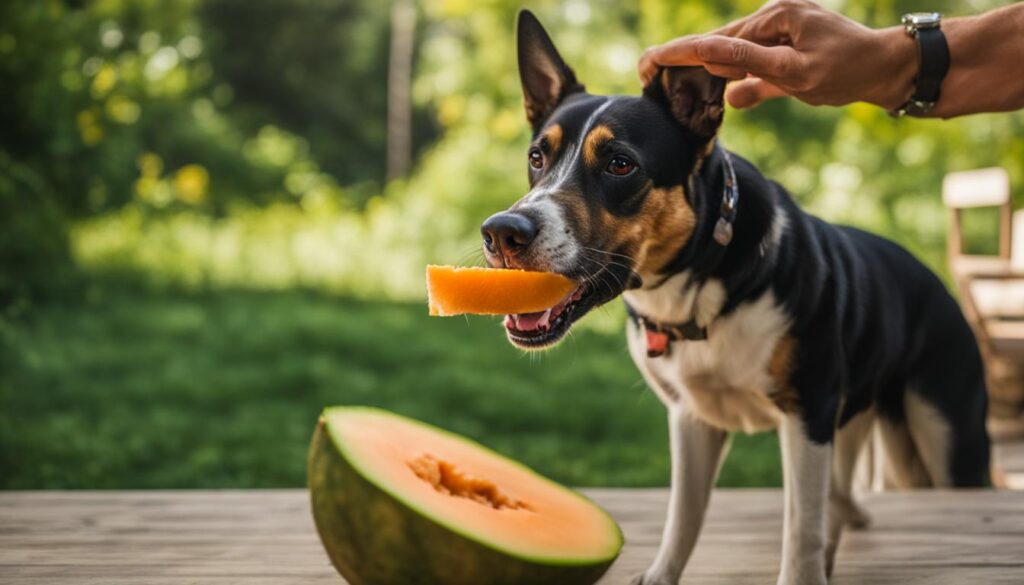
Dogs can enjoy cantaloupe as a delicious and nutritious treat. This sweet and juicy fruit is not only low in calories but also packed with essential nutrients that can benefit your furry friend’s health.
Cantaloupe is an excellent source of water and fiber, which can help support a healthy digestive system in dogs. The fiber content can aid in regulating bowel movements and preventing constipation. Additionally, the high water content can help keep your dog hydrated, especially during hot summer months.
While cantaloupe is a safe and healthy treat for most dogs, it’s important to offer it in moderation. This fruit contains natural sugars, which can contribute to weight gain and negatively impact dogs with certain health conditions, such as diabetes. It’s always best to consult with your veterinarian to determine the appropriate serving size based on your dog’s specific needs.
If you’re looking to provide your dog with a refreshing summertime snack, consider freezing balls or cubes of cantaloupe. Not only will it help keep your dog cool, but it can also add some excitement to their treat routine.
Remember to remove the rind and seeds before offering cantaloupe to your furry friend. These parts can be difficult for dogs to digest and may pose a choking hazard. Presenting the cantaloupe in small, bite-sized pieces is also recommended to prevent any potential choking incidents.
In summary, cantaloupe can be a healthy and enjoyable addition to your dog’s diet when offered in moderation. Its high water and fiber content make it a great choice for hydration and digestion support. Just be mindful of the sugar content and consult with your veterinarian to ensure it’s suitable for your dog’s specific dietary needs.
Cranberries

Dogs can eat cranberries, both fresh and dried, in small quantities. Cranberries are safe for dogs and can be a healthy treat. However, it’s important to avoid giving dogs dried cranberries that are sweetened, as they contain unnecessary sugar. Dogs can enjoy the tangy taste of unsweetened fresh or frozen cranberries, or they can have crunchy cranberry dog treats.
Grapes
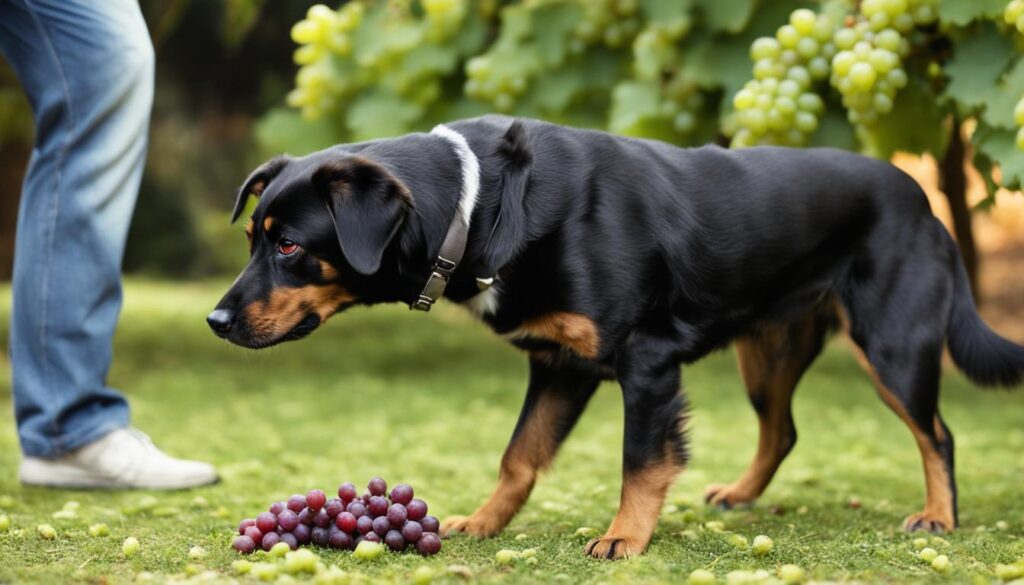
Dogs should never eat grapes or raisins, as they can be toxic and potentially fatal. Even a small amount of grapes or raisins can cause kidney failure in dogs. It’s important to keep grapes and raisins away from dogs and to seek veterinary attention if a dog ingests them.
It’s worth noting that the toxic substance in grapes and raisins is still unknown, and not all dogs will have the same reaction to them. Some dogs may consume small quantities without any immediate signs of toxicity, while others can experience severe symptoms after just a few grapes. Regardless, it’s best to err on the side of caution and avoid giving grapes or raisins to dogs altogether.
If your dog accidentally ingests grapes or raisins, it’s crucial to act quickly and seek veterinary attention. Inducing vomiting may be necessary to eliminate the grapes from the dog’s system, and the veterinarian might also administer activated charcoal to help absorb any remaining toxins. The dog’s kidneys will be closely monitored for any signs of damage or dysfunction.
Signs of grape or raisin toxicity in dogs:
- Vomiting
- Diarrhea
- Loss of appetite
- Abdominal pain
- Excessive thirst or urination
- Lethargy
- Weakness
- Tremors
- Seizures
If you suspect that your dog has ingested grapes or raisins, don’t wait for symptoms to appear. Contact your veterinarian immediately for guidance and possible emergency treatment. Remember, prevention is key when it comes to keeping your furry friend safe and healthy.
Mango
Dogs can eat mangoes as they are packed with vitamins and minerals. Mangoes contain vitamins A, B6, C, and E, as well as potassium and antioxidants. It’s important to remove the pit before feeding mangoes to dogs, as it can be a choking hazard. Mangoes should be given as an occasional treat due to their high sugar content.
Oranges
Dogs can eat oranges as they are a good source of vitamin C, potassium, and fiber. Oranges can provide a tasty and healthy treat for dogs. However, it’s important to remove the peel and seeds before offering oranges to dogs. The peel can be difficult for dogs to digest and may cause gastrointestinal upset. Additionally, the seeds can be a choking hazard.
When feeding oranges to dogs, it’s best to offer them in small, bite-sized pieces. Some dogs may enjoy the taste of fresh oranges, while others may prefer frozen pieces as a refreshing treat.
Oranges should be given to dogs in moderation, as their high acidity content may cause digestive discomfort in some dogs. It’s always important to introduce new foods gradually and monitor your dog for any adverse reactions.
In summary, while oranges can be a healthy addition to a dog’s diet, it’s crucial to remove the peel and seeds and offer them in moderation. As with any new food, it’s recommended to consult with your veterinarian before incorporating oranges into your dog’s diet to ensure it is suitable for their individual needs.
Peaches
Dogs can eat peaches as they provide fiber, vitamin A, and other nutrients. Peaches are a delicious and juicy fruit that can be a healthy and refreshing treat for dogs, especially during the summer months. However, it’s important to take certain precautions when feeding peaches to your furry friend.
Firstly, always make sure to remove the pit before giving peaches to your dog. The pit can be a choking hazard and should never be ingested by dogs. Additionally, the pit contains a small amount of cyanide, which can be harmful to dogs if consumed in large quantities.
To offer peaches to your dog, you can simply slice the fresh peach and remove the pit, then offer the flesh as a tasty treat. You can also freeze peach slices for a refreshing and soothing snack during hot weather. Frozen peach slices can help cool down your dog and provide some relief from the heat.
It’s important to note that while fresh peaches are safe for dogs, canned peaches should be avoided. Canned peaches often contain high amounts of sugary syrups, which can be detrimental to a dog’s health and lead to weight gain or other issues. Stick to fresh peaches to ensure your dog enjoys all the natural benefits without any added sugars.
As with any new food, it’s recommended to introduce peaches gradually and monitor your dog’s reaction. Some dogs may be more sensitive to new foods, and peaches may cause gastrointestinal upset or allergies in rare cases. If you notice any negative reactions, such as vomiting or diarrhea, discontinue feeding peaches and consult your veterinarian.
Remember, moderation is key when it comes to treats, including peaches. While dogs can enjoy the occasional peach slice, it should not make up a significant portion of their diet. Always prioritize a balanced and nutritionally complete dog food as the main source of nutrition for your furry companion.
Wrapping Up
In conclusion, it is safe for dogs to consume certain types of berries as part of a balanced diet. Apples, bananas, blueberries, cantaloupe, cranberries, cucumbers, mangoes, oranges, peaches, pears, pineapples, pumpkins, raspberries, strawberries, and watermelon can all be enjoyed by dogs in moderation. These fruits provide various vitamins, minerals, and antioxidants that can contribute to their overall health.
However, it is crucial to remember that not all berries are safe for dogs. Avocados, grapes, and raisins should be avoided, as they can be toxic and potentially harmful to dogs. These fruits can lead to various health issues, including kidney failure, and should be kept out of reach of your furry friend.
When offering fruits to dogs, it is essential to remove any harmful parts such as seeds, pits, peels, or stems. These parts can pose a choking hazard or contain toxins that may be detrimental to your dog’s health. Additionally, it’s best to cut the fruits into small, bite-sized pieces to prevent any choking risks.
Before making any changes to your dog’s diet, it’s always wise to consult with your veterinarian. They can provide specific guidance based on your dog’s breed, size, age, and any pre-existing health conditions. Your veterinarian will offer personalized advice to ensure that the fruits you introduce into your dog’s diet align with their nutritional needs.
FAQ
Can dogs have berries?
Yes, there are certain berries that dogs can safely eat.
What are some dog-friendly berries?
Dogs can eat strawberries, blueberries, raspberries, and blackberries in moderation.
Are berries safe for dogs to eat?
Yes, these berries are safe for dogs to consume as long as they are given in moderation.
Can dogs eat strawberries?
Yes, strawberries are safe for dogs to eat. They are a good source of vitamins and antioxidants.
Can dogs eat blueberries?
Yes, blueberries are safe for dogs and are even considered a superfood due to their high antioxidant content.
Can dogs eat raspberries?
Yes, dogs can eat raspberries. They are a good source of fiber and antioxidants.
Can dogs eat blackberries?
Yes, blackberries are safe for dogs to eat. They are rich in vitamins and dietary fiber.
Can dogs eat cranberries?
Yes, dogs can eat cranberries in small quantities. Fresh or unsweetened cranberries can be a healthy treat for dogs.
Can dogs eat grapes?
No, grapes are toxic to dogs and should be avoided. Even a small amount can cause kidney failure in dogs.
Can dogs eat mangoes?
Yes, dogs can safely eat mangoes. They are packed with vitamins and minerals.
Can dogs eat oranges?
Yes, dogs can eat oranges. However, it’s important to remove the peel and seeds before offering them to your dog.
Can dogs eat peaches?
Yes, dogs can eat peaches. However, make sure to remove the pit before feeding them to your dog.






